Roasters brewing up artisan coffee movement in North County
Encinitas and Carlsbad are among communities that are home to entrepreneurs
Coffee has long been a major component of American breakfasts, but in recent years, a great number of small specialty coffee roasters have popped up in San Diego County.
Reuters recently reported that an annual industry survey from the National Coffee Association found 64 percent of Americans drank a cup of coffee within 24 hours. That number — based on a survey of 3,000 people over 18 — has grown from 62 percent in 2017 and is at its highest rate in the past six years.
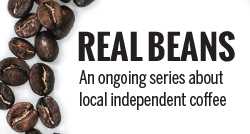 Specialty coffee consumption is trending upward, in particular when looking at the habits of younger coffee consumers, according to the Tea and Coffee Journal. While San Diego has had a flourishing cafe scene for years, the specialty roasting scene is now growing to meet market demands.
Specialty coffee consumption is trending upward, in particular when looking at the habits of younger coffee consumers, according to the Tea and Coffee Journal. While San Diego has had a flourishing cafe scene for years, the specialty roasting scene is now growing to meet market demands.
For some cafe owners, the decision to begin roasting coffee has been as a way to ensure that they are serving a high-quality product.
Lofty Coffee Co. began as a cafe in Encinitas in 2011 and later started roasting its own beans across the street in 2014.
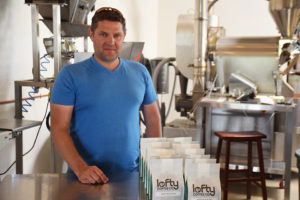
“I figured out how to have a cafe model that works really well, but then I wanted to improve the quality of everything, and coffee was one of those things,” said Eric Myers, owner of Lofty. “We were getting really good coffee, and it was being custom-roasted for us, but I wanted control of this so I wanted to become a roaster.”
Once Lofty began serving its own roasted beans, Myers said he noticed a slight difference in the clientele and their reactions to the coffee.
“Being a cafe-operator and roaster, I think there’s a trust that people get from you because they’re like ‘OK, this is implied quality,’ even though that’s often not the case,” Myers said. “I think in the past four-plus years, we’ve really developed a following for our high-quality coffee.”
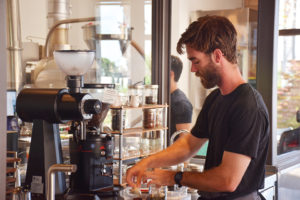
Output capacity of beans varies among bean roasting facilities throughout San Diego. Lofty roasted 55,000 pounds of coffee in 2017, which is primarily served in its cafes and local grocery stores such as Seaside Market, Lazy Acres and Whole Foods.
“We’re not a big-volume roaster by any means,” Myers said. “We’re definitely what I would classify us as a ‘boutique’ coffee roaster. Even locally, Better Buzz probably does a couple hundred thousand pounds … so we’re a lot smaller of an operation.”
On an even smaller scale is MadMike’s Coffee, based in Carlsbad, which has roasted about 3,000 pounds in its first year of operation. As roasting operations grow, owner Casey Tokubo predicts that he will continue to be highly involved with production.
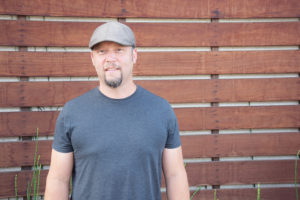
“No matter how large the company becomes, I want to have my hands in the process — I want to control it,” Tokubo said.
Tokubo, one of the newest coffee roasters in the region, began roasting coffee as a teenager in Sonoma County in the early ’90s.
Through his time as a roaster, he has seen in-house coffee roasting grow from a small, niche market to being a much more mainstream concept. One of the biggest changes Tokubo has seen over the course of his career is the use of social media to promote the sale of beans.
“I’m really new to social media and the whole concept behind it — I never even had a Facebook account until April or May last year,” Tokubo said. “Everyone was telling me it’s a necessary part of business now — so that was a big learning curve there.”
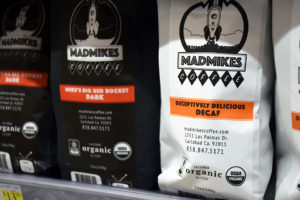
Currently selling through his website and Amazon, he said that the latter allows him to reach a wider market of coffee drinkers.
“You do need to be found (on Amazon), but there is somewhat of a captive audience,” Tokubo said. “They’re there to shop, versus trying to funnel people into the website — usually it seems like people go to the website after they’ve tried the coffee.”
While many coffee roasters were created as standalone businesses or as additions to coffee shops, others — such as Sleeping Tiger Coffees in Carlsbad — don’t fit the same mold.
After Mayur Pavagadhi took over operations of Witch Creek Winery in 2015, he decided to incorporate a coffee roaster into his business plan, said Fallon Rusing, director of coffees.
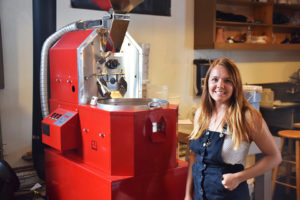
“Mayur went to Lofty in Encinitas and had a coffee epiphany,” Rusing said. “He was like, ‘This is so cool; if they can do it, why can’t I?’”
The roastery, which is housed inside of Witch Creek’s tasting room, became the first roastery in downtown Carlsbad.
Before becoming a roaster, Rusing worked as a barista at Blue Bottle Coffee and Equator Coffees & Teas in Northern California.
When she was hired at Sleeping Tiger, she began as an assistant to the roaster, but became the director of coffees soon after opening. As a way to hone her skills in coffee roasting, Rusing became a certified roaster through the Specialty Coffee Association.

“(SCA) is a big deal in our little world,” Rusing said. “They define all the parameters of how to do coffee the way we do coffee because we’re craft or specialty. To be certified through them was really cool and I learned so much.”
An important part to roasting is tasting the flavor of the beans through the cupping process. Cupping is done with beans that have been roasted within 12 to 24 hours using beans ground to the same coarseness used for pour-over coffee and fully immersed in water, Rusing said.
Spoons are then used to remove the ground beans, and tasters check for aroma and flavor using an aeration method to properly coat the back of the palate.
“You want to be able to taste origin, not roast,” Rusing said. “We get to a point in roasting where we just taste roast — we stop tasting what’s special about the origin.”
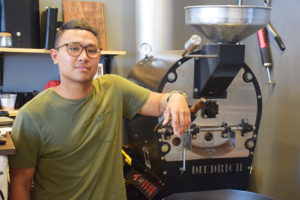
Environmental factors are key elements in purchasing and roasting coffee beans due to climate change, according to Matthew Delarosa, cofounder and lead roaster at Ironsmith Coffee Roasters.
Availability, quality and flavor can all be adversely affected by changing weather patterns, Delarosa said.
“Coffee is harvested usually once a year, depending on rainfall,” Delarosa said. “If the rainfall started early or later, that forces farmers to change how they’re harvesting their coffee. If it rains too early, they’re going to harvest their coffee too early, and that will impact the flavor of their coffee, and vice versa.”
Delarosa, who began as a home roaster, opened Ironsmith in Encinitas five years ago. Just as important as environmental sustainability to Delarosa is the financial sustainability of coffee producers.

Instead of purchasing fair-trade beans, which he said are generally a dollar more than the commodity price of coffee per pound, he instead purchases coffee at $3-4 more per pound.
“We buy directly — we go to Colombia, we went to Ethiopia and we went to Guatemala this year and met with farmers,” Delarosa said. “We paid them directly for their coffee and circumnavigated the commodity market … that way, the money is going directly to them and not being paid to three or four different middlemen.
“That’s the direct trade model, and I think that’s the only way to create a more sustainable market in the coffee industry for high-quality coffee.”
This year, all of Ironsmith’s coffee was purchased through direct trade, Delarosa added.
Several North County roasters compare the current coffee roasting trend to the brewery trend. Even with so many specialty roasters, the market is not yet oversaturated.
“I think that there is always room for growth — I don’t think competition is bad,” Tokubo said. “I don’t think having multiple choices is bad for customers. I think if you’re doing your thing, your way, no one else is going to be doing that.”
Lauren J. Mapp is a local freelance writer



